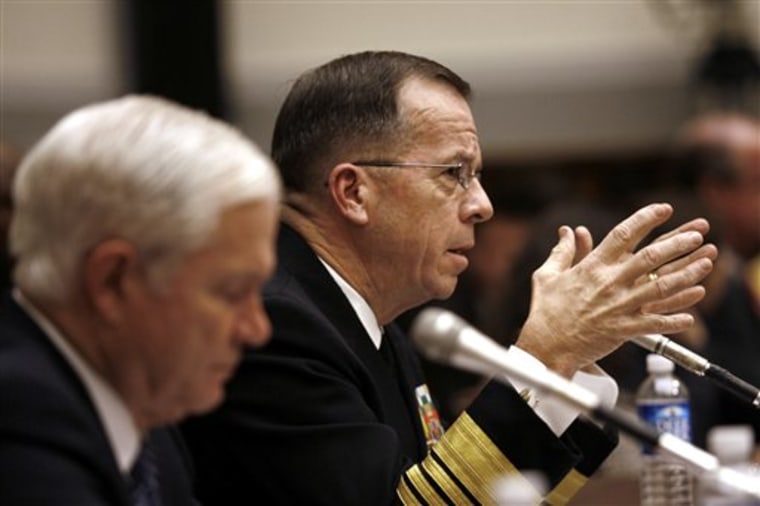Defense Secretary Robert Gates on Thursday pushed European allies for more troops to re-energize efforts in southern Afghanistan, where the Taliban insurgency has increased its attacks in the 18 months since NATO took command of the war.
Even as it struggles to find a way out of Iraq, the Bush administration is saddled with troubling signs in Afghanistan, where the government is weak, the insurgency is relentless and casualties are mounting. Gates also must worry about sagging public support.
Opening two days of talks with allied defense and diplomatic officials, Gates hoped to stir discussion of forming an overarching strategy for Afghanistan that could be adopted by NATO government leaders at a summit in April. It was not clear that all NATO members agree such a plan is even needed, and no firm decisions on a way forward were expected in Edinburgh.
The Edinburgh talks marked the latest effort by Gates to inject a sense of urgency not only in the south, where the Taliban's influence is strongest, but also on the broader challenge of strengthening the central government in Kabul and building an economy that does not revolve around the illicit drug trade.
Gates has cautioned since the beginning of his tenure at the Pentagon one year ago that the gains achieved in Afghanistan over the past six years are at risk of being lost unless the United States and its NATO allies carry out comprehensive military, economic and diplomatic solutions.
"If the world's greatest democracies cannot summon the will to accomplish a mission that all agree is morally just and essential for our collective security, then the citizens of these democracies will begin to question the mission's worth," Gates told the House Armed Services Committee on Tuesday.
Demands continue
He and other U.S. officials have expressed concern that much of Europe has lost sight of the purpose of fighting in war-weary Afghanistan, whose former Taliban rulers gave sanctuary to al-Qaida leaders, including Osama bin Laden, in the years before they carried out the Sept. 11, 2001, terrorist attacks.
Gates wants NATO to adopt and publish a short statement — the first of its kind, according to his aides — that would spell out briefly and plainly why the war is important, what U.S. and allied troops are doing there and how they can help the Afghan government.
The document would look three to five years into the future to set an overarching goal, plus set benchmarks to measure progress, according to a senior defense official who discussed the concept on condition that he not be identified. His name could not be used under ground rules set by the Pentagon.
Critics of the Bush administration's efforts in Afghanistan charge that the war in Iraq has been a distraction, drawing away resources and energy that could have been used to stabilize Afghanistan.
In testimony on Capitol Hill on Tuesday, Adm. Mike Mullen, chairman of the Joint Chiefs of Staff, acknowledged in unusually blunt terms that the U.S. has chosen to make Iraq first priority.
"In Afghanistan we do what we can," Mullen said. "In Iraq we do what we must."
The allies who want to help in Afghanistan also feel constrained _ for reasons that do not always meet with U.S. approval. For example, to limit the risk of casualties, some allied governments put heavy restrictions on the way their troops can be used. U.S. officials complain that this limits their usefulness.
The United States has about 26,000 troops in Afghanistan; together, NATO members other than the U.S. have a similar total. Britain is the largest non-U.S. contributor, with about 7,800 troops.
Deadliest year since invasion
More than 6,200 people have been killed in insurgency-related violence, according to an Associated Press tally of figures from Western and Afghan officials.
Gates wants the Europeans to pony up more troops — about 3,500 trainers for the Afghan police, plus additional mentors for the Afghan army, 16 helicopters and at least three battalions of ground forces.
Maj. Gen. Bernard Champoux, NATO's deputy commander for security in Afghanistan, said a successful operation to retake the southern town of Musa Qala from Taliban fighters was a hopeful sign. But he acknowledged that the Afghan and allied forces are hard pressed to hold onto their gains.
"We do have insufficient forces," Champoux said. "We have to be selective, and we have to prioritize how we're going to apply force."
There are now about 11,000 NATO troops in southern Afghanistan, under British command.
Some question whether more troops are needed.
In a new assessment published by the Center for Strategic and International Studies on Wednesday, analyst Julianne Smith cautioned that the situation in Afghanistan is growing increasingly unstable.
"Afghanistan is heading in the wrong direction, and short of a complete overhaul of NATO strategy, it threatens to take its people, the future of the alliance and trans-Atlantic relations along with it."
Gates had one-on-one meetings Thursday with Canadian Defense Minister Peter MacKay and Australia's new defense minister, Joel Fitzgibbon. Then he was attending a dinner hosted by British Defense Minister Des Browne and joined by their counterparts from the other NATO allies with troops in southern Afghanistan: the Netherlands, Canada, Australian, Romania, Denmark and Estonia.
